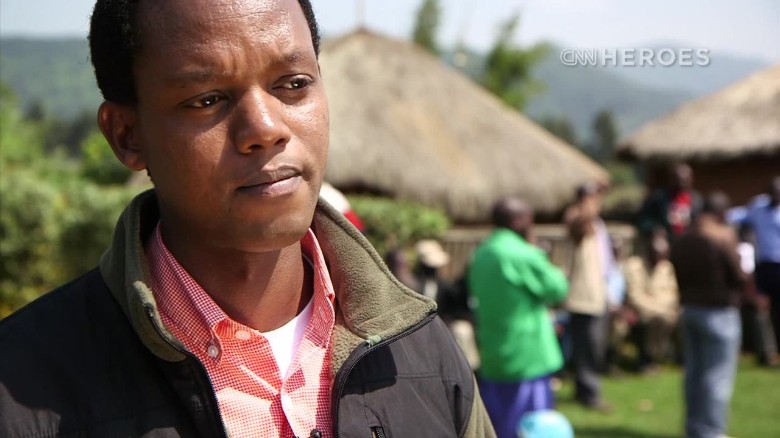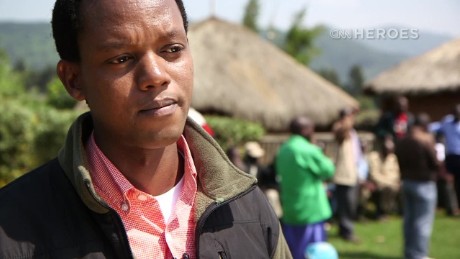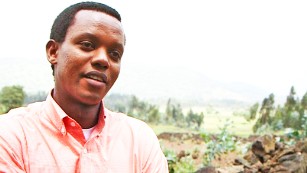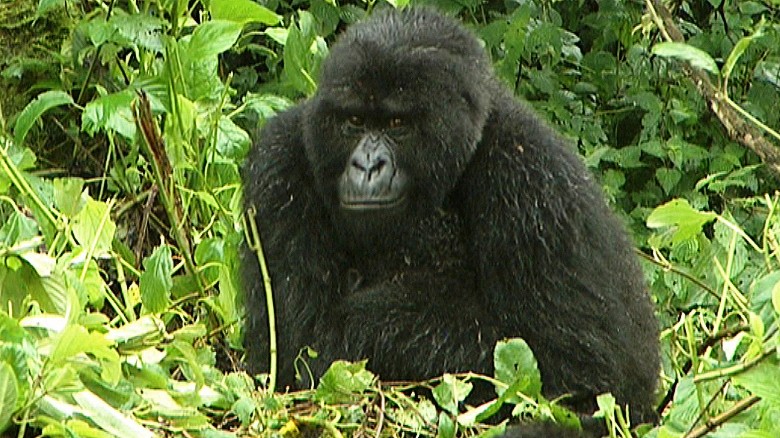A nonprofit helps protect gorillas in Rwanda from being killed by poachers. 01:51
Story highlights
Edwin Sabuhoro's nonprofit turns gorilla poachers into protectors
Iby'lwacu Cultural Village offers income opportunities near a habitat for endangered gorillas
Do you know a hero? Nominations are open for 2015 CNN Heroes
(CNN)Edwin Sabuhoro will never forget the first time he saw a gorilla in the wild.
"It was magical," he said. "He sat right there and looked me straight in the eye. I felt something in me that I couldn't define."
The experience inspired Sabuhoro to leave his law career and become a warden at Volcanoes National Park in Rwanda. There he was in charge of protecting the endangered mountain gorillas.
Fewer than 900 mountain gorillas are living in the wild today. Their biggest threats come from deforestation and the region's growing population.
"We had a lot of cases of poachers ... killing, setting snares, cutting bamboo," Sabuhoro said.
See more CNN Heroes
In 2004, he helped track down a group of poachers by posing as a potential buyer for a baby gorilla. The baby was saved, and the poachers were imprisoned.
But Sabuhoro wanted to find a solution to the bigger problem. So he met with more than 100 poachers and their families to find out why they were killing wildlife.
"One old man looked at me and said, 'Your kids are starving to death. Would you poach to feed your family?' " Sabuhoro said. "It was an eye-opener for me."
In 2006, he set out to help the local community improve its livelihood. What started as a farming program has since grown into a nonprofit, the Iby'Iwacu Cultural Village, which helps families generate income through tourism.
Sabuhoro says more than 10,000 people have benefited from the program. It is among many conservation efforts contributing to a 26% increase in the region's mountain gorilla population.
Do you know a hero? Nominations are open for CNN Heroes 2015
CNN talked with Sabuhoro about his efforts. Below is an edited version of the conversation.
CNN: Your program now helps families and protects wildlife. How does it work?
Sabuhoro: In the cultural village, we share with tourists our local food, our traditional culture, our ways of living. Tourists can give back to the community, and the local communities have an incentive to conserve the park.
We also train villagers how to do crafts, products that they can sell in markets. And that money they take back to their families. They're able to send their kids to school; they're able to buy food; they're able to start businesses.
We also have communities working directly with rangers to provide intelligence about poachers. This is voluntary work. They understand why they need to protect the gorillas. We educate that this is their park and they have to protect it.


CNN Hero Edwin Sabuhoro: Saving the mountain gorillas 02:24
CNN: How did you first use farming to start your program?
Sabuhoro: I thought of an idea of turning poachers to farmers. I had $2,000, money I saved through my work in the park. I decided to withdraw all that money and divided the poachers into groups to rent land, buy seeds and start farming.
Six months later, they had harvested enough that they had enough food at home and they were selling the rest in the market.
It was so emotional for me to see how the little that I had helped could make a huge difference in people's lives. I thought we could do more here. We built the cultural village in 2006. Before we finished, we had tourists coming to visit us, and that gave communities a lot of hope and expectation.
CNN: How did your personal experiences lead you to this work?
Sabuhoro: My parents and my grandparents left Rwanda as refugees after the killings and tumult that took place. It was so painful as a kid growing up in absolute poverty. We would spend two, three days without food.
But our mom kept giving us this hope that tomorrow is going to be better. Tomorrow is going to be different. And we grew up with that idea. That kept happiness in us, kept us going.
I got my law degree in 2001 and was interested in pursuing environmental law. I thought, "This nature needs an advocate." But in a country still suffering from the aftermath of war and genocide, wildlife protection wasn't a priority for most Rwandans. I realized that in order to keep gorillas safe, we needed to help the villagers.

Edwin Sabuhoro's nonprofit turns poachers into protectors by offering income opportunities near a habitat for endangered gorillas.
CNN: You are passionate about saving gorillas. Why is this work so important to you?
Sabuhoro: During my time at the park, I grew fond of the gorillas and built relationships with them. It's unbelievable to see them every day.
After being away to get my master's degree in the UK, when I came back to the park one of the gorillas recognized me. He came over almost like to ask, "How have you been?" He showed me a wound on his foot from getting caught in a snare, and that was very touching for me. I began to understand that gorillas are so similar to human beings. I wanted to make sure the gorillas can survive and live with the same dignity.
If we don't do anything, they will go extinct. We can't afford to fail the wildlife. It was passed on to us by ancestors, and we have to work hard to make sure that we pass it on to the next generation.
Want to get involved? Check out the Iby'Iwacu Cultural Village website at cbtrwanda.org and see how to help.

No comments:
Post a Comment